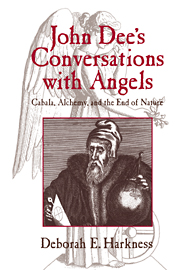Introduction
Published online by Cambridge University Press: 05 May 2013
Summary
We know in part, and we prophesy in part. But when that which is perfect is come, then that which is in part shall be done away.
When I was a child, I spake as a child, I understood as a child, I thought as a child:
but when I became a man, I put away childish things.
For now we see through a glass, darkly;
but then face to face: now I know in part;
but then I shall know. …
1 Corinthians 13:9–12Between 1581 and 1586, and again in 1607, Elizabethan England's most highly regarded natural philosopher, John Dee, talked with angels about the natural world and its apocalyptic end. With the aid of an assistant, or “server,” and a crystal called a “showstone,” Dee attempted to see through the dark days of his own time and into what he hoped was a bright and promising future. Scattered through several manuscript collections in the Bodleian and British Libraries, Dee's records of these conversations now represent one of the early modern period's most enduring intellectual mysteries: why would a Cambridge graduate who boasted the title “the Queen's philosopher” engage in such a seemingly fruitless, apparently groundless, and enormously time-consuming activity? Was Dee a gullible fool? Had he suffered a mental breakdown? Given these serious reservations about Dee and his conversations, historians of science have wondered if the angel diaries can yield any useful information to scholars specifically interested in the practice of natural philosophy in the late sixteenth century or illuminate the cultural and intellectual world of Elizabethans more generally.
- Type
- Chapter
- Information
- John Dee's Conversations with AngelsCabala, Alchemy, and the End of Nature, pp. 1 - 6Publisher: Cambridge University PressPrint publication year: 1999

